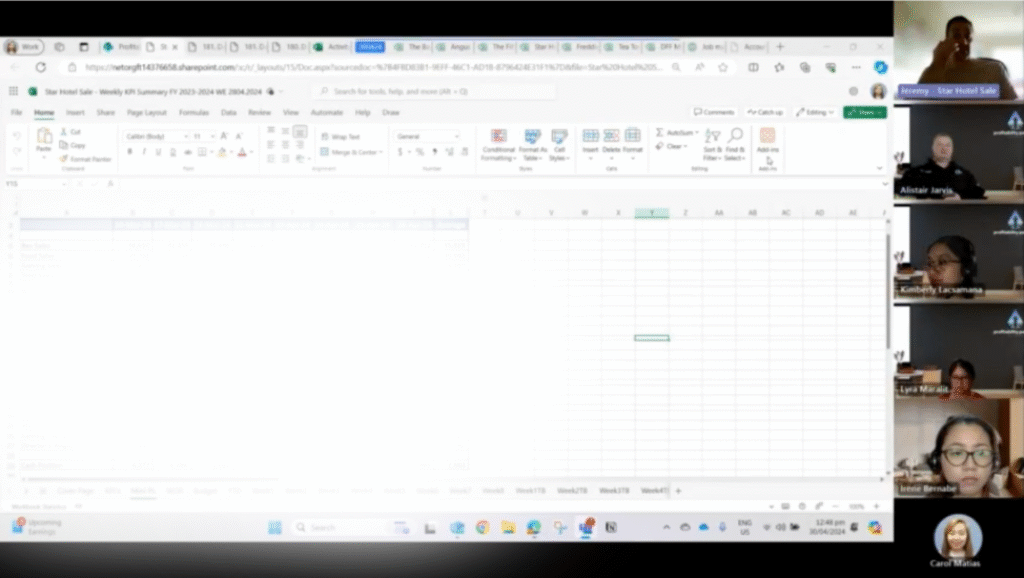In the world of financial reporting, precision and consistency are critical. While many businesses adhere to the standard calendar month for reporting purposes, we’ve chosen to align our month-end processes with Sundays. This approach isn’t arbitrary—it’s a deliberate strategy designed to improve financial visibility, operational efficiency, and decision-making. One of the key benefits is that it aligns seamlessly with our weekly profitability reports, forecasting, budget comparisons, and coaching sessions, ensuring a more integrated and actionable view of performance. Additionally, it simplifies operational tasks like month-end stock takes, making the entire process more efficient. Here’s why we believe using a Sunday month-end makes sense for businesses, especially in hospitality.
1. Aligning with Weekly Operations and Planning
In hospitality, we always plan in weeks. Weekly planning drives decisions around staffing, inventory, and promotions, making it the most natural unit of time for managing a venue. Aligning month-end with Sunday ensures that all revenue and costs from the week are captured together, creating a seamless connection between weekly and monthly reporting. By closing the books on Sunday, we align our financial processes with the operational rhythm of the business. This alignment makes planning, analyzing, and adjusting strategies easier and more effective.
2. Consistency with Weekly Profitability Reports, Coaching, and Budget Comparisons
Our weekly coaching sessions play a vital role in helping businesses monitor financial health and plan for the future. By using a Sunday month-end, we ensure these sessions align perfectly with our profitability reports and budget comparisons. This consistency allows us to:

- Track Weekly Profit Trends: Weekly profit indications give businesses a clearer understanding of short-term performance.
- Enhance Coaching Outcomes: Our coaching sessions leverage weekly data to help managers refine their decisions and align with long-term goals.
- Frequent Budget Comparisons: More frequent comparisons to budget ensure that any variances are identified and addressed promptly, rather than waiting until month-end.
- Streamline Decision-Making: Aligned reporting and coaching ensure weekly insights translate into actionable, strategic adjustments.
This integration ensures that no information is lost, and financial decisions are based on a comprehensive, real-time view of performance.
3. Simplifying Month-End Stocktakes
A Sunday month-end takes the pressure off performing stocktakes during busy trading periods, such as Saturdays. Instead, stocktakes can be conducted after the close of Sunday trading, when the venue is typically quieter. This brings several benefits:
- Reduced Disruption: Staff can complete stocktakes without interfering with peak service times or impacting the customer experience.
- Improved Accuracy: Conducting stocktakes during calmer periods ensures more accurate inventory counts, which directly impact cost-of-goods-sold (COGS) calculations.
- Streamlined Processes: Managers and staff can establish a predictable routine for stocktakes that aligns with financial reporting, reducing errors and inefficiencies.
4. Supporting Weekly Operational Planning and Coaching
Operational planning in hospitality revolves around weekly patterns, and a Sunday month-end ensures financial reporting aligns with this approach. Our weekly coaching sessions help managers connect operational decisions to financial outcomes, empowering them to make better decisions. For example:
- Labor Costs: Staff schedules often reset on Mondays, so capturing an entire week up to Sunday allows for more precise labor-to-sales ratio analysis.
- Inventory Management: Aligning with weekly ordering patterns ensures that cost of goods sold (COGS) is calculated cleanly for each period.
- Forecasting and Coaching Goals: Weekly forecasts and coaching tied to Sunday closures help businesses plan labor, inventory, and promotions with precision for the weeks ahead.
5. Simplifying Comparisons Across Periods

In businesses with a heavy focus on weekly performance, using a Sunday month-end ensures that each reporting period contains the same number of weekdays and weekends. This consistency makes it easier to compare:
- Week-to-Week Performance: Identify trends and anomalies with greater accuracy.
- Month-to-Month Results: Analyze sales, wages, and other key metrics without the distortion of partial weeks.
By eliminating irregular cutoffs, such as splitting a weekend between two months, we achieve greater clarity in our reporting.
6. Streamlining Communication and Accountability
By setting Sunday as the month-end, all stakeholders—owners, managers, and staff—have a clear and predictable timeline for reporting, coaching, and reviewing results. This fosters better communication and accountability:
- Managers can focus on finalizing numbers after the weekend, without interruptions from midweek operations.
- Coaching sessions ensure decisions align with profitability reports and month-end financials.
- Staff and accountants have a predictable schedule for closing tasks, reducing errors and missed deadlines.
7. Addressing Hospitality-Specific Challenges
Hospitality businesses face unique challenges, including fluctuating daily revenue, high weekend sales, and seasonality. A Sunday month-end ensures these complexities are accurately represented. For instance:
- A calendar month-end might split a high-revenue weekend between two reporting periods, under-representing the month’s performance.
- A Sunday month-end captures the full impact of peak trading days, providing a truer picture of the venue’s financial health.
Conclusion: Practicality and Precision in Reporting
Using a Sunday month-end isn’t just about convenience—it’s about aligning financial reporting with the operational realities of our business. Hospitality planning happens in weekly cycles, and a Sunday month-end ensures reporting flows naturally from these patterns. By aligning month-end with weekly profitability reports, forecasting, budget comparisons, and coaching sessions, we create a unified and actionable financial system. Additionally, simplifying stocktakes by conducting them after Sunday trading ensures smoother operations and more accurate results. This approach ensures consistency, supports better decision-making, and provides a clearer view of performance. By capturing the full picture of revenue and costs within natural weekly cycles, we help businesses focus on what matters most: understanding their numbers and driving profitability.
For us, the Sunday month-end is more than just a financial practice—it’s a cornerstone of how we deliver accurate, actionable insights to our clients.

